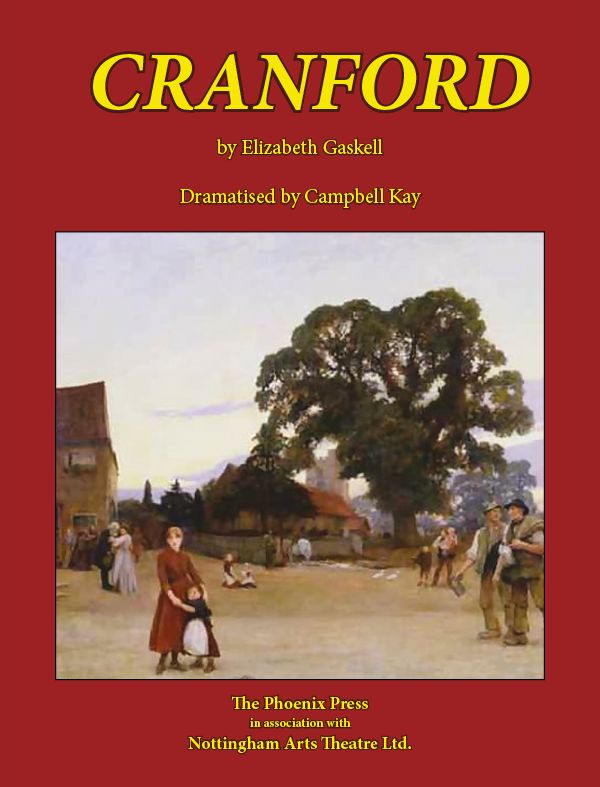Cranford
Cranford was first published in serial form in the nineteenth century publication Household Words edited by Charles Dickens, whose approach to Mrs Gaskell when persuading her to write for him was, to say the least, flattering: "As I do honestly know that there is no other English writer whose aid I would desire to enlist... I venture to ask whether you can give me any hope that you will write a short tale, or any number of tales, for the projected pages."
Obviously Dickens' flattery succeeded - the first part of what was to eventually become Cranford duly appeared in Household Words on December 13th 1851. The complete novel was published in book form 1852. However, its immense popularity developed only after Mrs Gaskell's death in 1865, so much so that by the middle of the 20th century over 170 separate editions had been published and the book has, so far, never been out of print.
Part of the book's appeal no doubt lies in its charm, its sentiment and the eccentricities of its central characters. Yet the social world of Cranford is precisely and critically observed by Mrs Gaskell and whatever sentiment exists is tightly controlled. Admittedly 'charm', 'delicacy' and 'sentiment' do have their parts to play, but to concentrate on them solely is to under-estimate part of the strength of Cranford. Mrs Gaskell does draw our attention to the odd or ridiculous nature of her characters' behaviour, but only in a way that reveals the human or social reality from which that behaviour springs. We, like out guide Mary Smith, ought to come to a realisation that, in spite of the pettiness, snobbery and social frustration to be found in Cranford society, the ladies of Cranford are not simply quaint and old-fashioned, but live life according to a code which puts a strong emphasis on humanity, loyalty, kindness and good neighbourliness.
That being said, Cranford is a town undergoing change with little understanding of how it can adapt itself to the social transformation which is inevitable. Hence, much of the pathos of Cranford stems from the defeats the ladies suffer and their gradual isolation from the mainstream of Victorian life. Throughout there is an emphasis placed on the wide variety of modern development - the railways, the growth of trade, however vulgar, financial crashes and gangs roaming the countryside. Against such forces the ladies of Cranford are helpless. Times are changing and it is precisely these changing times that Cranford is about.
Although it has been claimed that Mrs Gaskell is looking back with sentimental affection at a way of life being destroyed by industrial society, we cannot ignore the implicit criticism of Cranford society that is demonstrated in Mary Smith's concentration on Miss Matty's life, where humanity and simple goodness are balanced with the snobbery, and stultifying narrowness, which have left her a lonely old spinster supported by the charity of her friends.
Having said that, there is much to admire in the way the ladies of Cranford choose to live their lives and Mrs Gaskell always retained a special affection for the novel: "It is the only one of my books," she wrote, "that I can read again - whenever I am ailing or ill, I take Cranford and laugh over it afresh." It is hoped that laughter will also be part of an audience's response and that they will gain as much pleasure from watching this adaptation of the novel as Mrs Gaskell did in re-reading it.
Praise for 'Cranford'
"Campbell Kay's adaptation of Cranford is extremely entertaining and, on occasion, very funny. However, underscoring the comedy is the reality of life in a small rural town as it undergoes social and industrial change. The play skillfully and subtly conveys the conflicts, struggles and triumphs of the ladies of Cranford as they come to terms with their changing circumstances." - BBC Radio
"[An] evening of gentle humour and humanity. But besides being a faithful rendition of Cranford in terms of narrative, Campbell Kay's adaptation captures the underlying themes of the original novel. It is clear that an old order is giving way to a new - the railway has arrived. The old Tory values of a small country town are about to be swept aside by industrial capitalism." - Nottingham Evening Post
"To condense the whole of Cranford into a couple of hours entertainment is quite an achievement but Campbell Kay has pulled it off by concentrating on the essential elements of the story. As a result whilst the script has pace it does not feel rushed or incomplete... with a script as well crafted as this one the play should have universal appeal." - Amateur Stage

